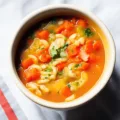The cold season brings sniffles, sore throats, and the desire to hunker down under a blanket with a mug of hot tea or soup. While there’s no foolproof way to avoid getting sick, focusing on nutrient-dense foods and staying hydrated can help support your immune system and gut health.
Eat More Immune-Boosting Foods
Certain foods contain key vitamins, minerals and antioxidants that can give your immune system a helpful boost. Be sure your diet includes plenty of:
- Citrus fruits for vitamin C
- Red bell peppers for vitamin C and A
- Broccoli for vitamins A, C, and E
- Garlic and onions for immune-boosting sulfur compounds
- Yogurt with live cultures to support healthy gut bacteria
- Nuts and seeds for zinc, selenium, and vitamin E
Stay Hydrated
When cold and flu viruses attack, your body needs plenty of fluids to function properly. Water, broths, herbal teas, and diluted fruit juices are healthier options than sugary sodas or coffee.
Bone Broth and Chicken Soup
Warming, soothing bone broths have gut-friendly gelatin and nutrients like calcium, magnesium and phosphorus. Chicken soup made with vegetables contains vitamin A, potassium and selenium too.
Get Plenty of Sleep
Your body needs adequate rest to repair and strengthen your immune defenses. Adults should aim for 7-9 hours per night.
Manage Stress
Chronic stress can weaken your immune response. Healthy stress-relieving habits like meditation, yoga, journaling or spending time outdoors can help counter everyday anxiety.
FAQ
What vegetable has the most vitamin C?
Red bell peppers contain more than 3 times the vitamin C of oranges, providing 317% of your daily need per cup! They also have beta carotene.
Should I take vitamin C supplements when sick?
Most people don’t need vitamin C supplements if eating a healthy, balanced diet with citrus fruits and vegetables. Talk to your doctor before starting supplements.
Can chicken soup cure a cold?
While it can’t cure a cold, chicken soup with lots of vegetables provides fluids and nutrients to help you feel better while you recover.
How much sleep do I need when sick?
Adults need at least 7 hours per night normally, but allowing extra rest while ill can strengthen your immune response. Naps may help too.
What foods reduce inflammation?
Anti-inflammatory foods include oily fish, nuts, olive oil, whole grains, green leafy vegetables, berries and yogurt. Limiting processed foods helps too.









